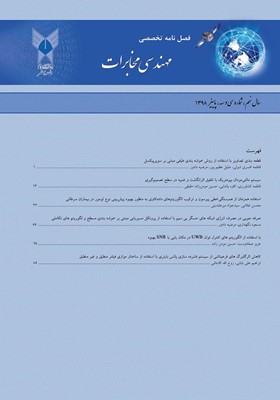بهبود SNR در مکانیابی با UWB با استفاده از الگوریتمهای کنترل توان
محورهای موضوعی : مهندسی الکترونیکعزیز صفادوست 1 , حسین مومن زاده حقیقی 2
1 - مهندسی کامپیوتر،تحصیلات تکمیلی،دانشگاه آزاد،بوشهر،ایران
2 - استادیار،گروه مهندسی کامپیوتر،تحصیلات تکمیلی،دانشگاه آزاد،بوشهر،ایران
کلید واژه: Localization, مکانیابی, نسبت سیگنال به نویز, ultra wide band, فضای سرپوشیده, باند فوق وسیع, الگوریتم کنترل توان, دید مستقیم و غیر مستقیم, signal to noise ratio, power control algorithm, line of sight and non line sight,
چکیده مقاله :
در مکان یابی فضای سرپوشیده با استفاده ار باند فوق وسیع، مقدار نسبت سیگنال به نویز (SNR) نقش بسزایی در مکان یابی دارد.در مکان یابی عواملی از قبیل اثر پدیده نویز،اثر پدیده چند مسیری و اثر انتشار بدون دید مستقیم سبب تضعیف در دقت و صحت در مکان یابی در فضای سرپوشیده می شود.مکان یابی با استفاده از باند فوق وسیع یک راه حل مناسب موقعیت یابی در فضای سرپوشیده است بهبود SNR در این روش سبب افزایش در دقت و صحت مکان یابی در باند فوق وسیع می شود. بهبود SNR با استفاده از الگوریتم های کنترل توان راه حل پیشنهادی در این مقاله است.بدین صورت که از الگوریتم های کنترل توان در دستگاه های فرستنده و گیرنده استفاده می شود .کنترل توان بر روی توان ارسالی انجام می شود و در دو حالت دید مسقیم و بدون دید مستقیم به بررسی میزان SNR پرداخته شده است. با استفاده از الگوریتم های کنترل توان شاهد بهبود میزان SNR در دو حالت دید مستقیم و دید غیر مستقیم هستیم.
In indoor localization using ultra-wide band, the signal-to-noise ratio (SNR) has a significant role in localization. In indoor localization the factors such as the effect of the of noise phenomenon, the effect of multi-path phenomenon and the effect of non-line of sight emission have reduced the accuracy and precision of localization in indoor environment. Localization with ultra-wideband is a convenient positioning solution in indoor space. Enhancement of SNR in this way increases the accuracy and precision of indoor localization in the ultra-wide band. Enhancement of SNR using power control algorithms is the proposed solution in this paper. Power control algorithms are used in transmitter and receiver devices. Power control is performed on transmit power. The value of SNR in line of sight and non-line of sight has been evaluated. Using power control algorithms, we can see the enhancement of SNR in both in line of sight and non-line of sight.
- 1. Bernhard, Hofmann-Wellenhof., Herbert, Lichtenegger. Collins, James. (2012), Global positioning system: theory and practice, Springer Science & Business Media.
- 2. Verdone, Roberto. Dardari, Davide. Mazzini, Gianluca. Conti, Andrea. (2010), Wireless sensor and actuator networks: technologies, analysis and design. Academic Press.
- 3. Ieee standard for local and metropolitan area networks–part 15.4: Low-rate wireless personal area networks (lr-wpans), IEEE Std 802.15.4-2011 (Revision of IEEE Std 802.15.4-2006), pages 1–314, Sept 2011.
- 4. Ieee, std., (2007), 802.15.4a. IEEE Standard for Information Technology – Telecommunications and Information Exchange Between Systems - Local and Metropolitan Area Networks - Specific Requirement Part 15.4: Wireless Medium Access Control (MAC) and Physical Layer (PHY) Specifications for Low-Rate Wireless Personal Area Networks (WPANs), pages 1–203.
- 5.Ingram, S.J., Harmer, D., Quinlan, M., (2004), Ultrawideband indoor positioning systems and their use in emergencies, In Position Location and Navigation Symposium, pages 706–715, April 2004.
- 6. Sahinoglu, Zafer. Gezici, Sinan. Guvenc, Ismail. (2008), Ultra-wideband positioning systems: Theoretical limits, ranging algorithms, and protocols.
- 7.Vanderperren, Y., Leus, G., Dehaene, W., (2006), An approach for specifying the adc and agc requirements for uwb digital receivers, In The Institution of Engineering and Technology Seminar on Ultra Wideband Systems, Technologies and Applications, pages 196–200, April 2006.
- 8. Sivrikaya, F., Yener, B., (2004), Time synchronization in sensor networks: A survey, In IEEE Network, volume 18, Jul-Aug 2004.
- 9. Sharma, M., Parini, C.G., Alomainy, A., (2014), Investigation of toa-based ranging accuracy of a miniature ultra-wideband antenna for human motion capture applications, In 11th International Conference on Wearable and Implantable Body Sensor Networks, pages 11–15, June 2014.
- 10. Hightower, Jeffrey. Borriello, Gaetano. (2005), Location sensing techniques, Technical report, IEEE Computer.
- 11. Vossiek, M., Wiebking, L., Gulden, P., Wieghardt, J., Hoffmann, C., P. Heide., (2003), Wireless local positioning, IEEE Microwave Magazine, 4(4):77–86, Dec 2003.
- 12. Gezici, S., Zhi Tian, G.B., Giannakis, H., Kobayashi, A.F., Molisch, H.V., Poor., Z Sahinoglu., (2005), Localization via ultra-wideband radios: a look at positioning aspects for future sensor networks, Signal Processing Magazine, IEEE, 22(4):70-84, July 2005
13. J. Zhang, R.A. Kennedy, (2004). Cramer-rao lower bounds for the time delay estimation of uwb signals. In IEEE International Conference on Communications, volume 6, pages 3424–3428 Vol.6, June 2004
- 14. Ashima Gupta and Prasant Mohapatra (2007). A survey on ultra wide band medium access control schemes. Computer Networks, 51(11):2976–2993, 2007.
- 15. Andreas F Molisch, Philip Orlik, Zafer Sahinoglu, (2006). Uwb-based sensor networks and the IEEE 802.15. 4a standard-a tutorial. In First IEEE International Conference on Communications and Networking, pages 1–6, 2006.
- 16. Maria-Gabriella Di Benedetto, Guerino Giancola (2004). Understanding ultra wide band radio fundamentals. Pearson Education, 2004.
- 17. B. Silva, Zhibo Pang, J. Akerberg, J. Neander (2014). Experimental study of uwb-based high precision localization for industrial applications. In IEEE International Conference on Ultra-WideBand, pages 280–285, Sept 2014.
_||_
